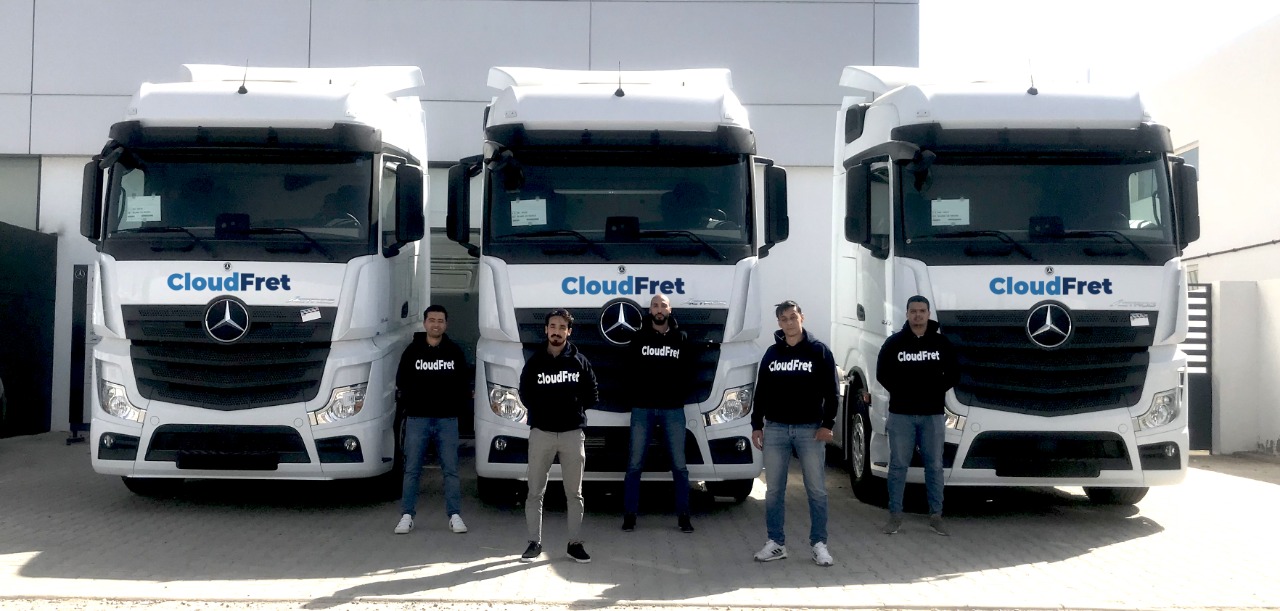CloudFret, a burgeoning startup, continues its impressive growth trajectory by securing an order book valued at €10 million for the digitalization of road freight. Several prominent accounts in the Automotive sector have placed their trust in CloudFret to enhance their logistics operations.
As a specialist in the digitalization of road freight transportation between Europe and Africa, CloudFret has announced new strategic partnerships with various Shippers in the Automotive industry. According to its CEO, Mr. Driss Jabar, CloudFret aims to “accelerate the digitalization of their Supply Chain and ease access to transport capacities through the largest network of TIR (International Road Transport) truckers in the Mediterranean region.”
More specifically, users of the digital solution will be able to optimize their transportation plans to “improve service quality, budget, responsiveness, visibility, and productivity.” Shippers can “book their truck, track and analyze shipments in real time, and access historical documents/records of completed transports for better control over their operations,” thus averting delays that could disrupt the production chain. This partnership will also generate additional revenue for carriers through significant optimization of trucks returning empty to factories.
The collaboration with Automotive industry players across the Mediterranean is expected to generate over €10 million in potential orders for 2024.
Founded in 2021 by Driss Jabar, with offices in Morocco and France, CloudFret has already positioned its international road transport organization solution to over 130 Shippers and aims to achieve a turnover of €100 million by 2026. The company regularly communicates its results, having posted a revenue growth of 420% in 2022, and is set to close 2023 with another triple-digit growth while reaching profitability, a rare feat for a two-year-old startup.

A New Approach to Connecting Shippers with Carriers
Driss Jabar, an engineer with a background from Station F, is committed to digitalizing the road freight transport market—a market valued at over €750 billion in Europe and Africa. To achieve this, the company has developed a platform designed to connect Shippers with Carriers. The service allows Shippers to book a full truck in just a few clicks for transporting their goods and to track their movement in real time. Simultaneously, it enables Carriers to avoid empty return trips, thereby reducing CO2 emissions, saving time, and reducing costs. To date, the startup boasts more than 7,000 trucks on its platform and aims to reach 10,000 by the end of 2023.
In a tense market, CloudFret’s approach is set to provide Automotive sector players on both shores of the Mediterranean with a better overview of their logistics, securing loading capacities, real-time analysis of shipments to anticipate operational risks, and optimize budgets. “This partnership is part of our commitment to initiate a digital transformation in road freight transportation. Beyond the economic opportunity it represents, it is primarily a significant environmental impact that will contribute to neutralizing CO2 emissions from one of the world’s most polluting sectors,” explains Driss Jabar, founder of the startup.
This presents an opportunity for various industry players to collaboratively design the logistics schemes of the future.
Solutions to Supply Chain Challenges
In the face of economic and environmental challenges, the pooling of resources and transport capacities has become essential to ensure the flow of products and goods. Among the challenges faced are:
- Tension in the transport supply due to driver shortages, scarcity of equipment, and fewer service providers impacted by two years of COVID.
- The surge in diesel prices forcing carriers to desperately adjust their tariffs, a survival strategy.
- Redesigning shippers’ supply chains to reduce dependency on Asia and Eastern Europe and decrease their carbon footprint, partly in response to the upcoming carbon tax in 2027.
These factors have led to a significant inflation of 20 to 25% in road freight, which the service providers could not absorb without facing financial difficulties. With limited opportunities for productivity, these inflationary factors had to be passed on to shippers to maintain service continuity and supply chain reliability.
While there is significant value to be added through the maturation of the road transport market, we must not be naive. This is a slow process requiring a change in mindset, but current crises are undeniable accelerators, and the most proactive organizations today will likely be tomorrow’s leaders.
Is a New Paradigm Emerging in the Road Transport Sector?
Digitalization of freight is a necessity, not a luxury.
Companies have been battered in recent years by a sector undergoing transformation with the advent of digital technology, marked by the rise of e-commerce and new consumption patterns, especially among Millennials who set their own consumption rules. In this context, several industrialists and distributors have been forced to cut staff.
Lagging in their digital transformation, these vulnerable players have finally accepted the reality they face. Rather than losing more time developing internal digital solutions, these giants are now embracing comprehensive, global solutions by allying with other major players to accelerate their digital transformation.
Did you know that Morocco has become the leading exporter of cars to the European Union, surpassing China, Korea, Japan, and Turkey? The Automotive activity has become a true powerhouse of the Moroccan economy, with exports expected to grow by over 30% in 2023, according to Bank Al-Maghrib.
CloudFret: Key Data
- Founder: Driss JABAR
- Launch: 2021
- Offices: Casablanca, Marseille, Agadir, Tangier
- Sector: Logistics
- Activity: Road freight transport
- Competitors: XPO, SJL, GEFCO, CALCINA CARRE, DB Schenker, etc.
- Website: www.cloudfret.com
